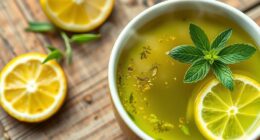Did you know that turmeric, the vibrant yellow spice commonly used in Indian cuisine, contains a powerful compound called curcumin? Curcumin has gained popularity in recent years due to its potential health benefits, including its anti-inflammatory and antioxidant properties.
In fact, studies have shown that curcumin can help reduce the risk of chronic diseases such as heart disease, cancer, and Alzheimer’s disease.
But how much curcumin should you consume in a day to reap these benefits? According to experts, the recommended daily intake of curcumin varies depending on your health goals and individual needs. While there is no one-size-fits-all answer, incorporating turmeric tea into your daily routine can be an effective way to consume curcumin.
In this article, we will explore the role of turmeric tea in curcumin consumption, discuss the recommended daily intake of curcumin, and provide practical tips on how to incorporate turmeric tea into your daily routine. We will also address any potential side effects and precautions to keep in mind.
So, let’s dive in and harness the power of curcumin in turmeric tea for a healthier you!
Key Takeaways
- Turmeric tea is an effective way to consume curcumin, which has anti-inflammatory and antioxidant properties.
- The recommended daily intake of curcumin varies depending on health goals and individual needs, but it is generally between 500-2,000 mg.
- Consuming turmeric tea with black pepper or fat enhances curcumin absorption.
- It is important to exercise caution and consume turmeric tea in moderation to avoid potential side effects and interactions with medications.
The Health Benefits of Curcumin
Did you know that consuming turmeric tea daily can provide you with numerous health benefits, thanks to the powerful compound called curcumin?
Curcumin is the active ingredient in turmeric that gives it its vibrant yellow color. It has been extensively studied for its potential health benefits and has shown promising results in various areas of health.
One of the key mechanisms of curcumin is its ability to reduce inflammation in the body. Chronic inflammation is linked to many diseases, including heart disease, cancer, and Alzheimer’s. Curcumin’s anti-inflammatory properties help to combat this inflammation and may help reduce the risk of these diseases.
Understanding the active compound in turmeric is essential to harnessing its full potential for health.
Understanding the Active Compound in Turmeric
To truly grasp the potency of the active compound found in turmeric, you should familiarize yourself with its chemical composition and its potential benefits.
Curcumin, the main active compound in turmeric, is responsible for its vibrant yellow color and numerous health benefits. When consumed, curcumin has been shown to have anti-inflammatory, antioxidant, and anticancer properties. However, curcumin absorption methods can be a challenge, as it’s poorly absorbed by the body. Factors such as low solubility in water, rapid metabolism, and poor bioavailability contribute to this issue.
To enhance curcumin bioavailability, it’s often recommended to consume it with black pepper, which contains piperine, a compound that enhances absorption. This can help maximize the benefits of curcumin in the body.
Transitioning to the subsequent section about the recommended daily intake of curcumin, it’s important to understand how much curcumin is necessary for optimal health.
Recommended Daily Intake of Curcumin
You might think that you don’t need to worry about how little curcumin you’re consuming, but let me tell you, incorporating a sprinkle of turmeric in your meals can do wonders for your overall health. Research suggests that a daily intake of curcumin between 500-2,000 mg is recommended for optimal health benefits. Curcumin supplementation can be an option for those who struggle to consume enough curcumin through their diet alone. However, it is important to consult with a healthcare professional before starting any supplementation regimen. To give you a better understanding of curcumin dosage, here is a table summarizing the recommended daily intake based on different health conditions:
| Health Condition | Recommended Daily Intake of Curcumin (mg) |
|---|---|
| General Health | 500-1,000 |
| Anti-inflammatory Benefits | 1,000-2,000 |
| Joint Health | 1,000-2,000 |
| Digestive Health | 500-1,000 |
| Cognitive Health | 500-1,000 |
Understanding the recommended dosage of curcumin can help you make informed decisions about incorporating turmeric into your daily routine. Now let’s explore the role of turmeric tea in curcumin consumption.
The Role of Turmeric Tea in Curcumin Consumption
When it comes to curcumin consumption, turmeric tea can play a significant role. One key point to consider is how much curcumin is actually in turmeric tea. It’s important to understand this in order to determine the amount of tea you should be drinking to meet your recommended daily intake.
Additionally, maximizing curcumin absorption is another important aspect to consider, as this will ensure that you’re getting the most out of your turmeric tea and reaping all of its potential health benefits.
How Much Curcumin is in Turmeric Tea?
Although the exact amount may vary, turmeric tea typically contains a significant level of curcumin, which contributes to its numerous health benefits.
Curcumin content can vary depending on the type of tea used to make turmeric tea. For example, research suggests that black tea may have a lower curcumin content compared to green tea or white tea.
Additionally, the bioavailability of curcumin in turmeric tea can be enhanced by adding black pepper or fat, such as coconut oil, to the tea. Black pepper contains a compound called piperine, which has been shown to increase the absorption of curcumin. Adding a source of fat also helps to enhance curcumin absorption, as curcumin is fat-soluble.
To maximize curcumin absorption, it is recommended to consume turmeric tea with black pepper or fat.
How to Maximize Curcumin Absorption
To optimize the absorption of curcumin, it’s recommended to consume turmeric tea with black pepper or a source of fat. Black pepper contains a compound called piperine, which has been shown to enhance the bioavailability of curcumin. Additionally, curcumin is fat-soluble, so consuming it with a source of fat can further increase its absorption. Adding a small amount of coconut oil or ghee to your turmeric tea can be a good option.
Apart from this, it’s also important to note that taking curcumin with a meal can improve its absorption. The presence of food in the digestive system can help facilitate the absorption of curcumin into the bloodstream. So, consider having your turmeric tea along with a meal for maximum benefits.
Now, let’s move on to the next section where we discuss the potential side effects and precautions associated with curcumin consumption.
Potential Side Effects and Precautions
Be careful not to overdo it with turmeric tea, or you might just experience some delightful side effects and precautions.
While turmeric is generally safe for most people when consumed in moderation, there are a few potential side effects and precautions to keep in mind.
Firstly, turmeric may cause an upset stomach or diarrhea in some individuals, especially when taken in large amounts. It may also interact with certain medications, such as blood thinners, so it’s important to consult with your healthcare provider if you have any concerns.
Additionally, turmeric has been found to stimulate the gallbladder, so those with gallbladder problems should exercise caution.
Incorporating turmeric tea into your daily routine can be a great way to enjoy its potential benefits. However, it’s important to listen to your body and consume it in moderation to avoid any potential side effects.
Incorporating Turmeric Tea into Your Daily Routine
When it comes to incorporating turmeric tea into my daily routine, I’ve found a few recipe ideas that I absolutely love. One of my favorites is a simple blend of turmeric, ginger, black pepper, and honey. I also enjoy adding a splash of coconut milk for extra creaminess.
Additionally, I’ve discovered other ways to include turmeric in my diet. I incorporate it into my smoothies, sprinkle it on roasted vegetables, and use it as a spice in my curry dishes. These simple additions have not only added a delicious flavor to my meals, but they’ve also provided me with the potential health benefits of turmeric.
Recipe Ideas for Turmeric Tea
Sip on a warm, golden cup of turmeric tea, infused with aromatic spices like ginger and cinnamon. Turmeric tea is not only delicious, but it also offers various health benefits.
There are several recipe variations for turmeric tea that you can try to add variety to your daily routine. For a basic recipe, combine 1 teaspoon of ground turmeric, ½ teaspoon of ground ginger, a pinch of cinnamon, and a teaspoon of honey in a cup of hot water. You can also add a squeeze of lemon for a tangy twist.
The curcumin content in turmeric tea can vary depending on the amount of turmeric used, but on average, a cup of turmeric tea contains about 150-200 milligrams of curcumin. This powerful antioxidant can help reduce inflammation and support overall health.
Now, let’s explore other ways to include turmeric in your diet.
Other Ways to Include Turmeric in Your Diet
To truly elevate your culinary creations, don’t forget to harness the vibrant power of turmeric by experimenting with it in various dishes and spices. Turmeric is a versatile ingredient that can add depth and complexity to your recipes. Try incorporating it into your favorite curry dishes, stir-fries, roasted vegetables, or even salad dressings.
You can also create your own turmeric spice blend by combining it with other complementary spices like cumin, coriander, and ginger. If you’re looking for a more convenient option, consider taking turmeric supplements, which can provide a concentrated dose of curcumin, the active compound in turmeric. These supplements are available in various forms such as capsules, powders, or extracts.
By exploring different turmeric recipes and supplements, you can easily incorporate this powerful spice into your daily diet. This will help you reap the numerous health benefits it offers, including its anti-inflammatory and antioxidant properties.
Transitioning into the next section, let’s now explore the conclusion: harnessing the power of curcumin in turmeric tea.
Conclusion: Harnessing the Power of Curcumin in Turmeric Tea
Make the most of your daily turmeric tea by harnessing the powerful benefits of curcumin, allowing it to enhance your well-being and bring a touch of golden goodness to your life.
Turmeric tea is a great way to incorporate curcumin into your diet, but there are a few things to keep in mind to maximize curcumin absorption and minimize any potential side effects or precautions.
To enhance absorption, it’s recommended to consume turmeric tea with a source of fat, such as coconut oil or black pepper, as curcumin is fat-soluble. Additionally, adding a pinch of black pepper to your tea can increase curcumin absorption by up to 2,000%.
It’s important to note that excessive consumption of curcumin may cause gastrointestinal issues or interact with certain medications, so it’s always best to consult with a healthcare professional before making any significant changes to your diet.
Enjoy your turmeric tea and reap the benefits of curcumin in a safe and effective way.
Frequently Asked Questions
Are there any specific health conditions or medications that may interact negatively with curcumin consumption?
Specific health conditions or medications that may interact negatively with curcumin consumption include bleeding disorders, gallbladder problems, and diabetes medications. Potential side effects of consuming curcumin with certain health conditions or medications should be discussed with a healthcare provider.
Can curcumin be absorbed effectively by the body when consumed in the form of turmeric tea?
Curcumin in turmeric tea is incredibly effective at being absorbed by the body. It offers a multitude of benefits, including reducing inflammation, improving brain health, and fighting oxidative stress.
How does the quality and source of turmeric used in the tea affect the curcumin content?
The quality and source of turmeric used in turmeric tea can impact the curcumin content. Factors such as freshness, processing methods, and origin can affect how well curcumin is absorbed by the body.
Is it safe to consume turmeric tea daily for an extended period of time?
It is generally safe to consume turmeric tea daily for an extended period of time. However, potential side effects like stomach upset and diarrhea may occur. Curcumin in turmeric tea supports overall health and well-being.
Are there any recommended timeframes or best practices for consuming turmeric tea to maximize the absorption of curcumin?
To maximize the absorption of curcumin in turmeric tea, it is recommended to consume it with a meal that contains healthy fats, such as olive oil or coconut milk. This can enhance curcumin’s bioavailability. However, it’s important to be mindful of the recommended dosage and potential side effects.
Conclusion
In conclusion, incorporating turmeric tea into your daily routine can be a practical and effective way to harness the power of curcumin. Studies have shown that consuming just one cup of turmeric tea a day can provide a significant amount of curcumin, with an average content of 200-300 milligrams. This interesting statistic highlights the potential health benefits that can be obtained by simply enjoying a warm and soothing cup of turmeric tea each day.
So why not give it a try and start reaping the numerous advantages of curcumin today?










